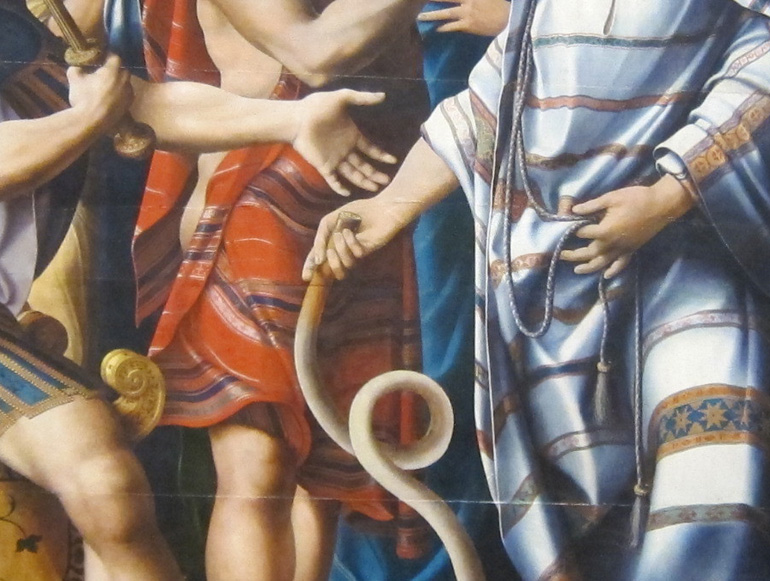Modern Moralist Note:
Trust With Truth
11 December 2013
Reading about Nelson Mandela’s achievement in South Africa has had a special piquancy picquancy, because Mandela seems to be exactly the antithesis of Hannah Arendt’s Adolf Eichmann, that clown about whom I’ve been reading. Mandela was intelligent, he was in possession of a simple truth (revenge is every bit as wrong as apartheid), and he was determined to press this truth home. He suffered badly, but he survived his suffering, or at least appeared to have done so; he was not broken by the eighteen-year stay on Robben Island. Above all, Mandela made a habit of doing the right thing. Moralists from Aristotle on down have insisted that this habit is the key to the good life.
In today’s Times, Thomas Friedman contrasts Mandela’s “moral authority” with the “formal authority” that is vested in duly elected officials. This distinction has been on my mind for decades, but I have never been able to put it so neatly. I can safely say that the overarching experience of my life has been witnessing the collapse of formal authority on almost every front. It is never enough, not anymore, to command respect. The best it can do is to command the police in an attempt, more or less successful, to preserve the status quo; formal authority can usually depend on the support of the propertied classes. The word for this abuse of formal authority is tyranny.
What is “moral authority”? To answer this question, Friedman turns to Dov Seidman, a “governance” coach and author of the book, How. Seidman, Friedman writes,
argues that another source of Mandela’s moral authority derived from the fact that “he trusted his people with the truth†rather than just telling them what they wanted to hear. “Leaders who trust people with the truth, hard truths, are trusted back,†said Seidman. Leaders who don’t generate anxiety and uncertainty in their followers, who usually deep down know the truth and are not really relieved, at least for long, by having it ignored or disguised.
Well, yes — although people trusted with the truth don’t always “trust back” right away. Sometimes, the leader has to spend some time in a place like Robben Island. But Seidman’s idea shows us, I think, what authority is going to be like in the future. What it means to be “moral” in this context is to pursue the truth as seriously and intelligently as one can, and to express it in language that allows its clarity to shine forth. What it means to be a “moral authority” is to trust other people to receive the truth into their hearts.
Let’s grant that the truth is sempiternal, always the same. At the risk of sounding condescending, I want to respect the grave need that many very intelligent people have to believe that truth is incorruptibly “out there.” I don’t believe this myself, but I don’t believe that it isn’t the case, either. I don’t know — and I don’t need to know. What I do know is that the truth is very complex, far too complex for comprehensive understanding by mortal minds. The history of civilization is essentially a sequence of shifting perceptions of the truth. Once upon a time, not so very long ago, it was “true” that the earth stood at the center of the universe. That’s just one example, but I think it sufficiently demonstrates just how massively wrong the truth can become in human hands. What is true, in this case, is that the world generally appears to stand still. So often, we are seduced into untruth by the powers of a meretricious logic — few words are as worrisome to me as “extrapolate.”
Human beings appear to have grasped an elementary set of commandments, or truths, about the conduct of life, but the application of these commandments is rarely straightforward. (How does a military chaplain parse “Thou shalt not kill”?) In our own time, we are bewildered by conflicting claims about truths of an economic nature. These claims appear to me to be both premature and self-serving (a combination characteristic of moral failure). Competing for attention, other people advance claims about the damage that human beings are doing to the Earth’s environment, and urging various courses of action that nevertheless have in common a dimness about the economic fact that human beings need good jobs in order to live meaningful lives. The only voices that come close to making sense of everything are the preachers of apocalpyse.
Most truths are not as simple as the evil of apartheid. They require questioning in the dark, measured discussion, and genuine humility. Grasping the nature of true humility is difficult enough all by itself; in great men, it looks more like an athletic skill than anything else.
What is so inspiring about Mandela, explained Seidman, “is that he did not make the moment of South Africa’s transition about himself. It was not about his being in jail for 27 years. It was not about his need for retribution.†It was about seizing a really big moment to go from racism to pluralism without stopping for revenge. “Mandela did not make himself the hope,†added Seidman. “He saw his leadership challenge as inspiring hope in others, so they would do the hard work of reconciliation. It was in that sense that he accomplished big things by making himself smaller than the moment.â€
I can hope only to be fractionally as inspiring as Nelson Mandela, but know this: I trust my readers.

